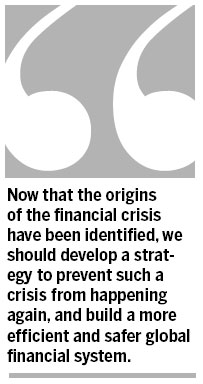Op-Ed Contributors
New reserve system priority for G20
Updated: 2011-04-15 07:33
By Zheng Xinli (China Daily)
Establishing a multi-currency international reserve system and monitoring mechanism should be a priority for the G20
From the second half of 2008, a financial storm that originated in the United States swept across the world. The root cause of this crisis was the US' long-term abuse of sovereign credit, the misuse of its status as a global major reserve currency issuing country and the promotion of twin deficits in its current account and the fiscal budget. The situation was further aggravated by the maintenance of US citizens' excessive consumption and the US government's over spending.
Any chance of preventing a financial crisis was lost when US credit rating agencies covered up the sovereign credit risk, reversed the risk relationship between debtor countries and creditor countries, and attracted international capital to high-risk regions.
Now that the origins of the financial crisis have been identified, we should develop a strategy to prevent such a crisis from happening again, and build a more efficient and safer global financial system. This is a key responsibility for the governments of the world.

The priority is to establish a multi-currency international monetary system, an international reserve currency monitoring and early warning system, and an international financial risk relief mechanism.
Establishing a multi-currency international reserve currency system is a fundamental way to maintain the stability of the international financial system. Such a global multi-currency reserve system could include the US dollar, the euro, yuan, yen, pound sterling and other currencies.
There are competition, checks and balances, and intermediation among currencies. A multi-currency system would encourage international reserve currency issuing countries' governments to adopt a prudent monetary policy to keep their currencies stable and maintain their sovereign credit.
Only by establishing such an international reserve currency system, can the international financial system overcome its over-reliance on a single sovereign currency and avoid excessive exposure to the risks of one currency.
With the collapse of the Bretton Woods System in the 1970s, international currencies decoupled from gold. The US dollar, which was based on the US' sovereign credit, became the major reserve currency. This allowed the US to transfer debt to foreign countries through currency depreciation. From 1971 to 2010, the US dollar depreciated 97.2 percent against gold, causing huge losses to countries holding US dollars.
Depreciation of the dollar slowly steals the wealth of owners with dollar-dominated assets, but the recent financial crisis made some dollar-denominated securities vanish instantly. It indicates that as the world's major reserve currency issuing country, the US' financial security is related to the vital interests of everyone. Therefore, an early warning and monitoring system for the supply and circulation of any major reserve currency is also essential.
However, the creation of a more efficient and safer international financial system should be gradual, the position of the US dollar as the dominant international reserve currency is irreplaceable in the near future. Given the negative affects the implementation of the quantitative easing policy by the Federal Reserve Board had on the global economy and financial stability, we should study common approaches in order to maintain the fragile recovery of the world economy.
With the increasingly close economic ties among countries, any financial problems for one country mean problems for others. In order to maintain international financial stability, all countries should unite and establish an international financial safety cooperation and risk relief mechanism. The Chiang Mai Initiative, which was created in the wake of the Asia financial crisis, is a good example of such a mechanism.
In the short term the International Monetary Fund should expand the scale of its Special Drawing Rights (SDR), adjust the proportion of SDR for each country based on proportional changes in their economy and global trade, and include currencies of emerging economies in the SDR basket. If one country is hit by a financial crisis, the IMF could give timely and effective relief to prevent the crisis from spreading.
To facilitate the creation of a competitive international multi-currency reserve system a permanent G20 executive office should be created. This office should then be responsible for monitoring the system and where necessary restricting the large-scale flow of international capital aimed at short-term arbitrage.
The large-scale short-term flow of international capital and its speculation are an important cause of international financial volatility. Each country should take united action to strengthen the restrictions on international hot money, such as regulations on the time limits of capital inflow and outflow, and the collection of capital gains tax, etc.
Directing investment into the real economy and using the capital and technology of developed countries to realize the industrialization and urbanization of developing countries would not only ease global inflation pressures but also create employment in developed countries and promote common development in all countries.
The executive office should be mandated to mediate the investment channels and attract excess liquid capital to the real economy. This should be done through the admission of qualified institutional investors and various funds, providing sound capital market functions, and expanding inter-government aid loans, in order to attract capital to nations and regions with high investment demands.
It should also reconstruct the international credit rating system, strengthen the professional ethics for credit rating agencies, break the monopoly of a few agencies on international credit ratings, and promote the objectivity and fairness of credit ratings.
The author is executive vice-president of the China Center for International Economic Exchanges.
Specials

In the swim
Out of every 10 swimsuits in the world, seven are made in China.

Big spenders
Travelers spend more on shopping than food, hotels, other expenses

Rise in super rich
Rising property prices and a fast-growing economy have been the key drivers.